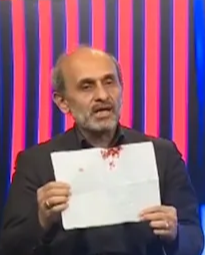
The image of Peyman Jebeli, director of the Islamic Republic of Iran Broadcasting (IRB), holding a blood-stained newspaper, but affirming after the Israeli bombing of the plant that the state television and its employees will endure until the end, simultaneously summarizes the nature of the most recent Zionist aggression against the Iranian press and people and the will of the Iranian reporters not to surrender.

Peyman Jebeli, director of the Islamic Republic of Iran Broadcasting (IRB)
Faced with the horror of another unjustifiable war, the Union of Cuban Journalists (IRB), in solidarity with its colleagues in Iran and its entire people, condemns in the strongest terms this new chapter of Zionist aggression under the auspices of its imperial mentor: the United States.
On Monday, humanity watched with horror as the IRB headquarters in Tehran was attacked by Israel during a live broadcast. Videos circulating on social media showed the moment—which will become another media icon of how evil powers target the messenger—in which the channel's host interrupted her broadcast after hearing a loud explosion.
Three employees of the station were killed in the bombing, and several of their colleagues were injured, leading the Committee to Protect Journalists to declare itself “horrified” by the attack. Sara Qudah, the organization's representative in the Middle East, stated that “Since Israel has killed, with impunity, nearly 200 journalists in Gaza, it now dares to attack media outlets in other parts of the region as well.”
UPEC supports this complaint, also contained in the assessments of the International Federation of Journalists (IFJ), an organization that has stated that following the attack by Hamas militants on October 7, 2023, and the (disproportionate) invasion with which Tel Aviv responded, the Israel Defense Forces (IDF) have killed more than 55,000 Palestinians, including at least 184 journalists and media workers.
The IFJ has evidence that the Israeli army has deliberately attacked journalists, and some of the cases are the subject of a complaint file before the International Criminal Court (ICC).
To the figures of the complete crime—one that takes human lives forever—are added the dozens of journalists injured, disappeared, and detained by the Israel Defense Forces (IDF), and the cases of assaults, threats, cyberattacks, censorship, and murders of family members carried out by them.
It's not opinion, but certifiable facts, that have led the Committee to Protect Journalists (CPJ) to name Israel as the most responsible for this particular atrocity, with around 70 percent of journalist deaths worldwide by 2024 hanging on its conscience?
The Zionist regime attempts with its journalist victims what every murderer does: avoid investigations, blame the dead, and ignore its duty to hold those accountable for their crimes.
The contempt for the aggressor and the cause of the victims are the same in Gaza and Tehran: Zionism doesn't want witnesses to its crimes, and the "worst" witnesses it could have—because they can multiply the truth—are journalists, so doing journalism in this war is like putting a target on your chest.
Israel wants to impose its narrative and conduct not only "damage control" of its policies, but also control reporting. Since the beginning of the aggression against Iran, live broadcasts showing the skies of Tel Aviv and Haifa lit up by Persian missiles and drones were abruptly interrupted. To kill at will, Benjamin Netanyahu needs all the darkness in the world.
To achieve this, he has the usual accomplices. Supposedly objective media outlets like CNN suspended live aerial coverage, while YouTube and Instagram, the offspring of their friendly colossus, immediately suppressed the "disturbing" images of a people (the Iranians) who seem to have committed the defect of defending themselves more than their aggressor calculated. Like all of Cuba, the UPEC is objective but not impartial: it always stands with those who defend their land.
In this chapter of the bombardment of the truth, which has intentionally deepened the information vacuum, the Israeli Army has detained several national and foreign reporters simply for recording the truth. For doing journalism!
UPEC supports the courage of our Iranian colleagues to report and resist, two inseparable verbs in countries attacked in multiple ways, like theirs and ours. Contrary to Israel's cynical accusation, the only "military purpose" of the Islamic Republic of Iran Broadcasting that can be accepted is to defend, even with a microphone, the homeland attacked with the most modern weapons in the United States arsenal.
As expected, the Islamic Republic of Iran has been an uncomfortable target for the genocidal gaze. Its journalists have been no exception. While the Armed Forces' missiles penetrate the "impenetrable" Iron Dome, videos of colleagues crack the dome of lies.
Both sides resist. After the attack, the television station resumed its live broadcasts. The world saw Hassan Abedini, a senior official in the state broadcasting system, say that "the (Israeli) regime was unaware of the fact that the voice of the Islamic revolution and of greater Iran will not be silenced by a military operation."
Nothing will silence her. We all saw on social media that at the moment of the explosion, presenter Sahar Emami was criticizing the enemy. A bomb blast was heard, Emami left the frame, and the screen in the background went black. It was then that a few words in Arabic ("Allahu akbar") resonated on the set. This is usually translated as "God is great," but in UPEC codes, it is also understood in another way: "Journalists do not fear!"
UPEC National Presidency
Havana, June 17, 2025

